What is IPN for peritoneal dialysis?
Introduction to Intraperitoneal Nutrition
Intraperitoneal Nutrition (IPN) is a targeted nutritional therapy specifically designed for patients undergoing peritoneal dialysis, a common treatment for those with end-stage renal disease. This therapy plays a crucial role in addressing the unique nutritional needs of dialysis patients, who face increased protein losses and nutritional demands due to their medical condition. In this article, we'll explore the critical aspects of IPN, including its benefits, administration, and implications on health outcomes, providing a comprehensive understanding of its significance in renal nutrition therapies.
The Concept of Intraperitoneal Nutrition (IPN)
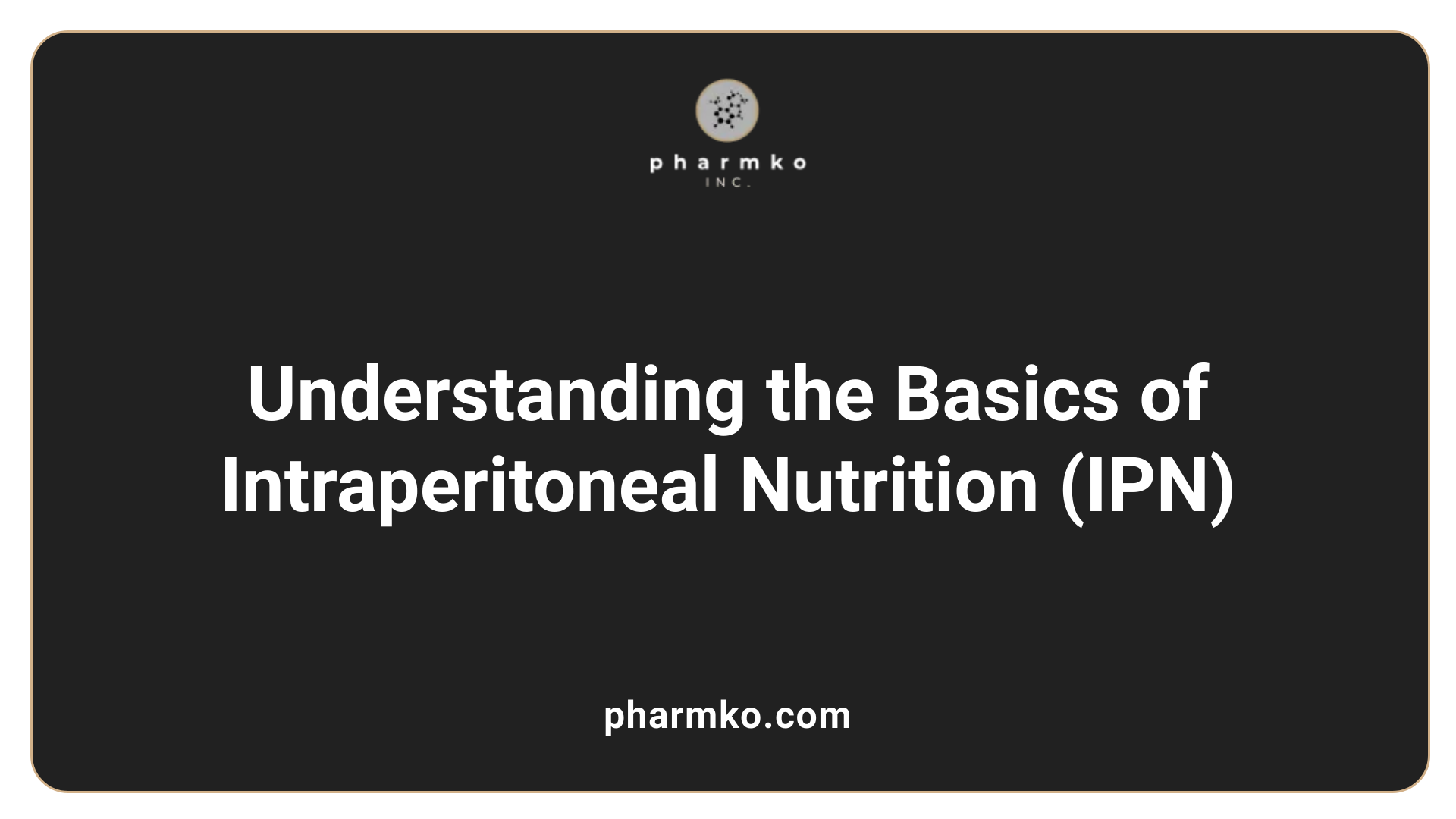
What is Intraperitoneal Nutrition (IPN) in dialysis?
Intraperitoneal Nutrition (IPN) is a specialized renal nutrition therapy tailored for patients undergoing peritoneal dialysis, including Continuous Cycling Peritoneal Dialysis (CCPD) and Continuous Ambulatory Peritoneal Dialysis (CAPD). This innovative treatment addresses the significant protein losses experienced during dialysis, which can average between 5 to 15 grams daily.
IPN works by delivering supplemental amino acids directly into the peritoneal cavity through the dialysate, replacing standard dialysis solutions with specialized Nutritional therapy bags like NutriRite Home™. Patients enrolled in this program receive weekly home deliveries of these therapy bags, coupled with training and monitoring from licensed healthcare professionals. It’s essential that such therapy is prescribed and monitored to ensure both safety and effectiveness in improving the nutritional status of dialysis patients.
Role of IPN in addressing protein loss
Studies have shown that effective absorption rates for IPN can reach up to 90%. This high rate of absorption allows patients to achieve their nutritional goals efficiently. By replenishing the protein lost during dialysis treatments, IPN not only enhances nutritional health but also supports overall well-being, thereby addressing the risk of malnutrition common in this patient population.
Overall, the implementation of IPN represents a vital component of the nutritional management strategy for patients on peritoneal dialysis, underscoring the importance of adequate nutrition in promoting better health outcomes.
Benefits and Purpose of IPN for Dialysis Patients
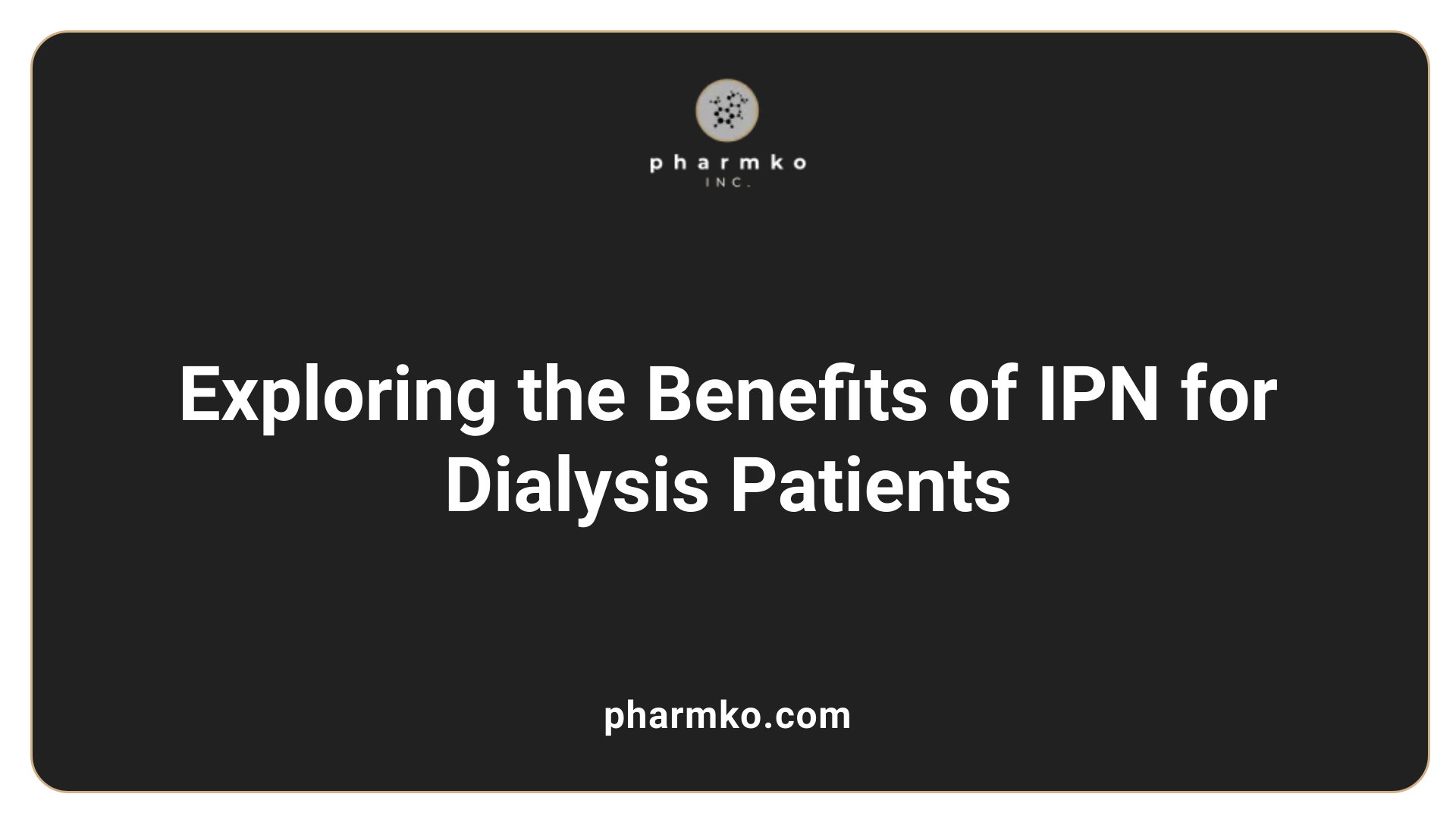
What are the benefits and purpose of Intraperitoneal Nutrition (IPN) for peritoneal dialysis patients?
Intraperitoneal Nutrition (IPN) serves a vital role in supporting the health of patients undergoing peritoneal dialysis (PD) by addressing malnutrition effectively. As these patients can lose between 5-15 grams of protein daily during dialysis, IPN is designed to replace this loss directly within the peritoneal cavity, ensuring that essential nutrients are administered without requiring additional oral intake.
For PD patients, the benefits of IPN include:
- Effective Nutrient Delivery : Nutrients, especially protein, are absorbed quickly from the peritoneal dialysate, enabling patients to meet their heightened nutritional demands.
- Maintenance of Protein Levels : Tailored IPN therapies, such as NutriRite Home™, add amino acids and other vital nutrients, enhancing nutritional status—vital for tissue repair and immune function.
- Monitoring and Personalization : Programs like those from Pentec Health involve continuous oversight by healthcare teams who adjust treatments based on individual patient responses.
- Improved Health Outcomes : Incremental increases in serum albumin levels, associated with IPN usage, indicate reduced risks of hospitalization and mortality, supporting better quality of life for patients.
Overall, IPN stands out as a critical nutritional intervention, helping to tackle protein-energy wasting (PEW) and improve the general health of patients on peritoneal dialysis.
IPN as a Nutritional Therapy in Chronic Kidney Disease
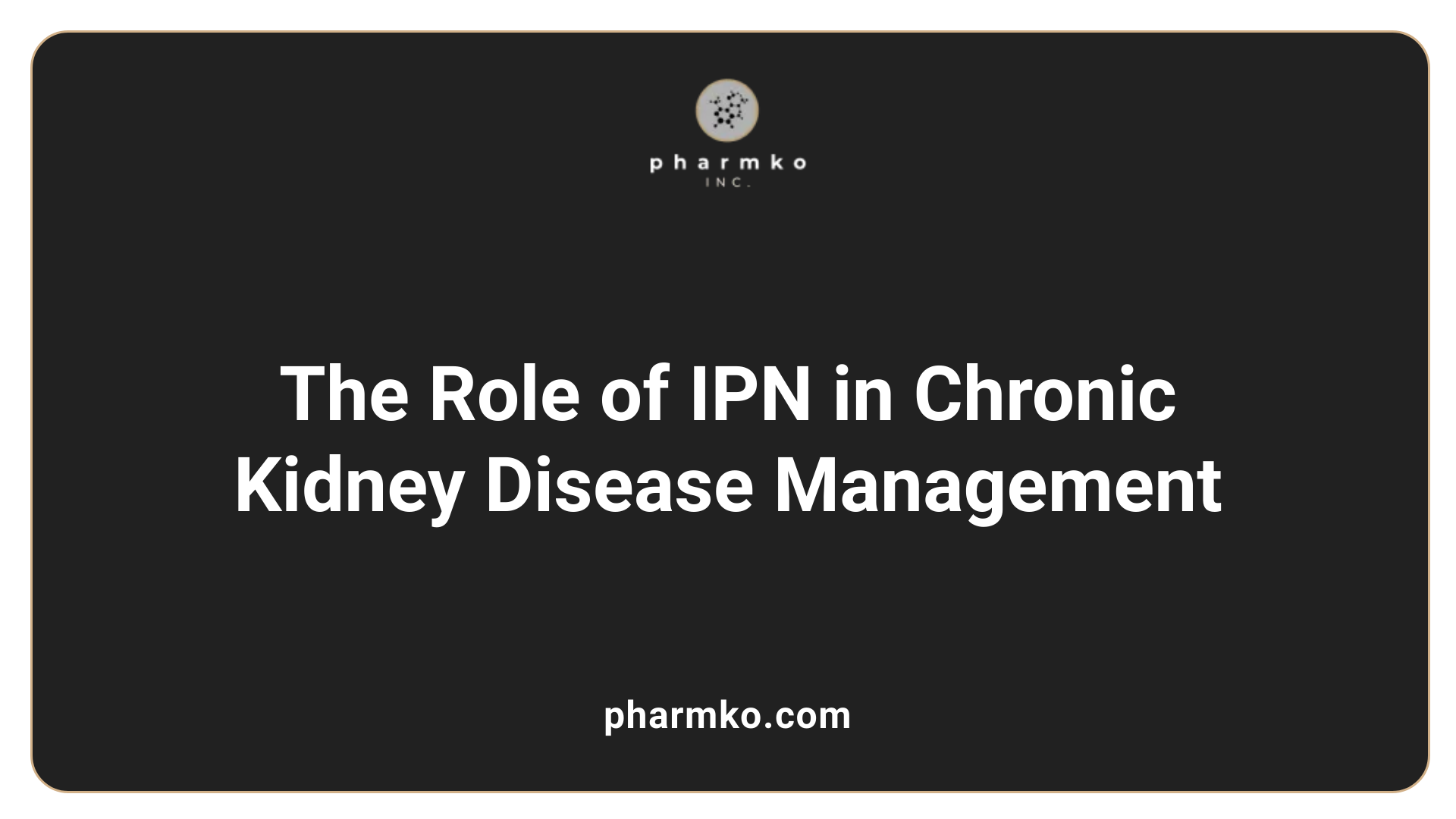
How does Intraperitoneal Nutrition function as a nutritional therapy for individuals with chronic kidney disease?
Intraperitoneal Nutrition (IPN) functions as a vital nutritional therapy for individuals with chronic kidney disease (CKD) by delivering essential nutrients directly into the peritoneal cavity during peritoneal dialysis sessions. This process is crucial since PD patients face increased nutritional needs, primarily due to protein losses occurring during dialysis, which average between 5 to 15 grams daily.
The IPN approach involves replacing one standard dialysis exchange with a specially formulated NutriRite Home™ bag, rich in amino acids that the body can absorb quickly. This method not only reinforces nutritional health but also counters the effects of protein-energy wasting (PEW), a common issue among CKD patients, facilitating improved healing and overall well-being.
Nutritional intervention through IPN helps manage low serum albumin levels linked to higher hospitalization rates. Incremental increases in albumin positively correlate with better clinical outcomes, making IPN an attractive option for addressing malnutrition in this specific patient population.
Impact of policy changes on IPN use
Recent policy changes have significantly influenced the application and accessibility of IPN. Medicare's improvements in coverage for nutritional therapies, particularly under Part D, have reduced the financial obstacles previously faced by patients needing IPN. This shift has stimulated healthcare providers' interest in implementing IPN as a regular part of dialysis treatment, as better coverage enhances patient outcomes by ensuring they receive adequate nutritional support without worrying about the costs.
Overall, IPN has stepped into a more prominent role in managing the nutritional status of dialysis patients through these policy advancements, reaffirming its essential place in the clinical strategies for CKD management.
Guidelines and Administration of IPN
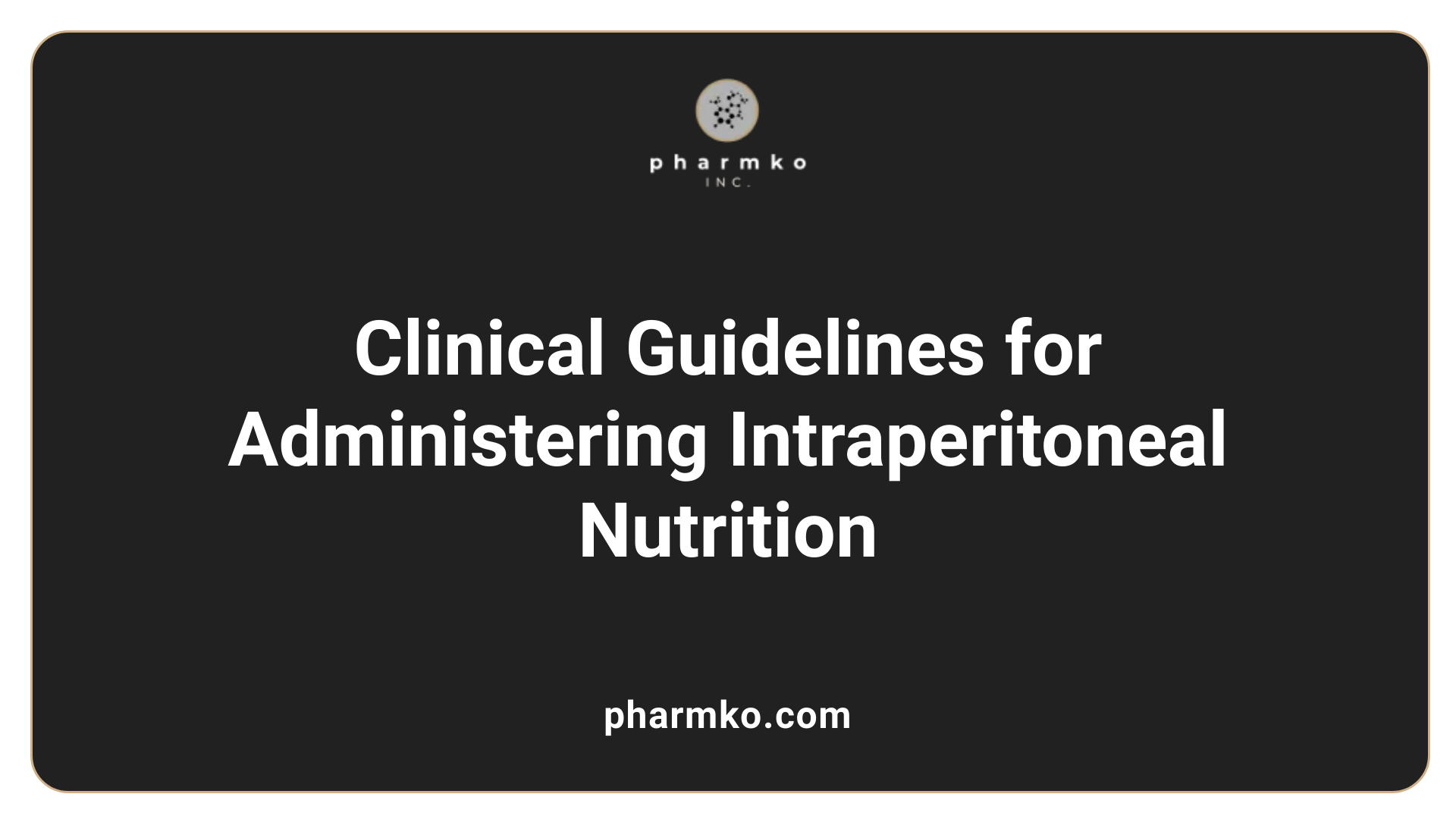
What are the clinical guidelines and administration methods for Intraperitoneal Nutrition?
Clinical guidelines for Intraperitoneal Nutrition (IPN) primarily involve supplementing amino acids during peritoneal dialysis. This therapy aims to compensate for protein losses experienced by patients, effectively addressing malnutrition. NutriRite Home™ is one methodology that delivers 75-85 grams of amino acids per treatment, enhancing patient nutritional status.
Implementing IPN requires healthcare provider involvement, including personal training delivered by licensed nursing staff. Ongoing monitoring by pharmacists ensures the therapy's efficacy and safety. Indications for starting IPN often include low serum albumin levels (below 3.5 g/dL) and low BMI (under 20).
Patients usually reach their nutritional targets within 6-12 months of beginning IPN. The approach is personalized, with treatments tailored to individual patient needs, and is often covered by most insurance plans, making it an accessible option for many patients struggling with nutritional deficits.
Comparing IPN with Other Nutritional Therapies
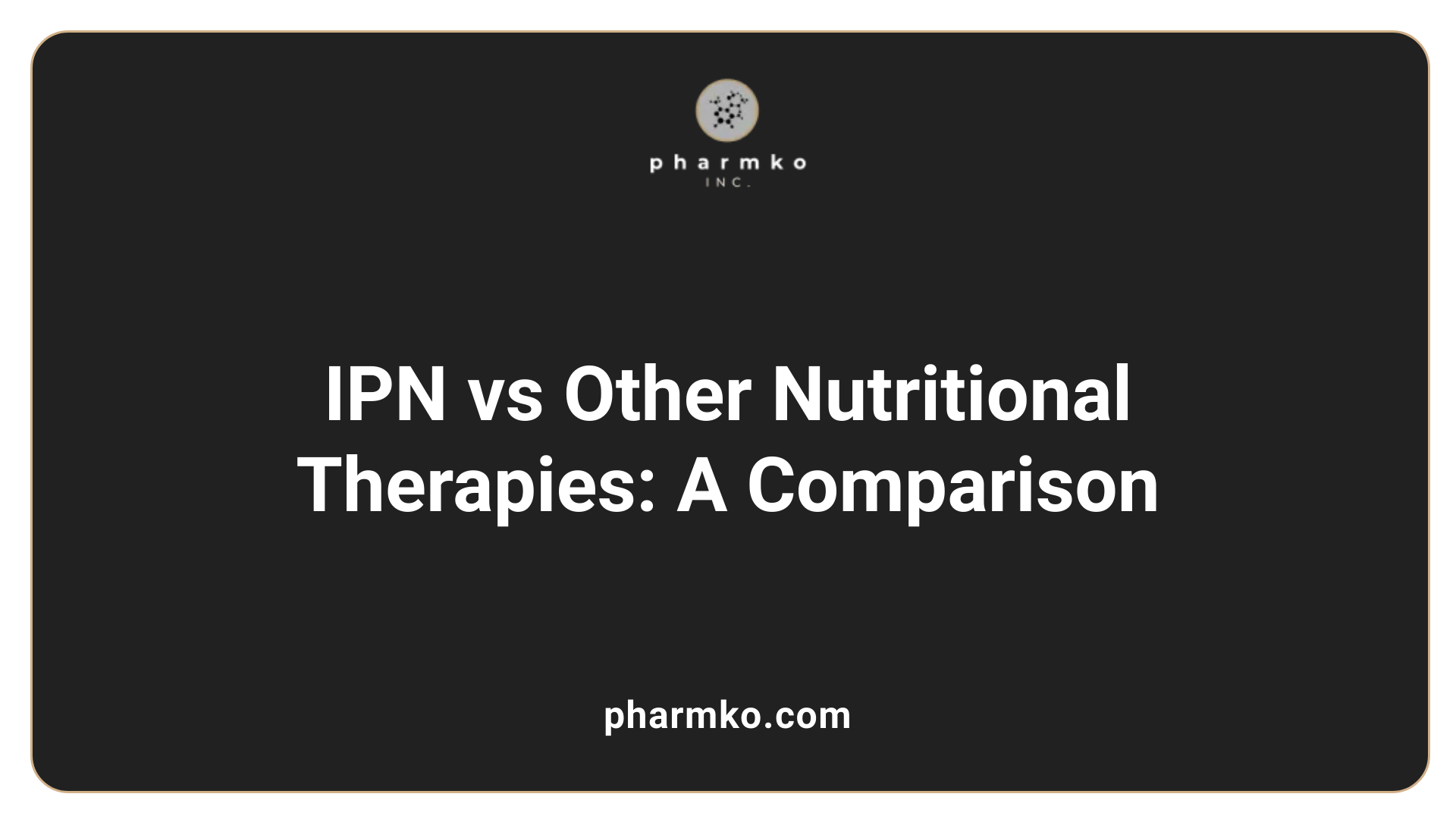
How does Intraperitoneal Nutrition compare to other nutritional therapies for dialysis patients?
Intraperitoneal Nutrition (IPN) serves as a potent nutritional therapy for individuals on peritoneal dialysis, uniquely integrating protein delivery into their regular treatment schedule. Patients undergoing dialysis have approximately 50% higher protein requirements compared to those without renal issues. This elevated demand makes it difficult for them to sustain nutritional health solely through diet.
IPN effectively supplies protein that is absorbed faster than protein from food sources, significantly improving appetite, strength, and energy. In contrast, Intradialytic Parenteral Nutrition (IDPN) delivers nutrients through the dialysis machine, catering to patients who require extra protein during their treatment sessions.
Both IPN and IDPN focus on enhancing the nutritional status of patients, ensuring individualized care through continuous monitoring by healthcare professionals. By tailoring interventions to meet specific needs, these therapies aim to mitigate the adverse effects of malnutrition while optimizing treatment efficacy.
| Nutritional Therapy | Delivery Method | Key Benefit |
|---|---|---|
| Intraperitoneal Nutrition (IPN) | Directly into peritoneal cavity | Provides rapid protein absorption, integrated with dialysis |
| Intradialytic Parenteral Nutrition (IDPN) | Via dialysis machine | Supplies additional protein during dialysis for enhanced support |
Conclusion: The Significance of IPN in Dialysis Care
Intraperitoneal Nutrition stands as a vital component of comprehensive care for dialysis patients, offering crucial nutritional support essential for managing malnutrition and meeting increased protein demands. Its tailored approach, facilitated by collaborations among healthcare professionals, has established IPN as a key strategy for improving patient outcomes. As coverage options have expanded, accessibility to this therapy increases, paving the way for enhanced health and quality of life for those facing the challenges of peritoneal dialysis. Further research and clinical experience will likely continue to refine and expand the application of IPN, cementing its role in renal nutrition therapy.
References
- NutriRite Home IDPN and IPN – Patient Care America
- [PDF] How IDPN & IPN therapy can benefit your patients.
- IDPN/IPN - Pentec Health
- [PDF] MCP 421 Intradialytic Parenteral Nutrition (IDPN) and Intraperitoneal ...
- IPN - Brooks Health care
- [PDF] THRIVE.
- Intraperitoneal nutrition support of an end-stage renal disease ...













